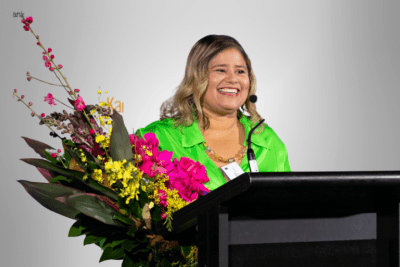7 Women Of WiBF Reveal Their Favourite Productivity Tips
16 Nov 2022
We asked some very productive WiBF members about the favourite tips and strategies they use to create and stay productive amidst all the distractions we face on a daily basis.
How productive were you today? It has never been a trickier question to ask or answer. For decades, our working lives were the same, year in, year out. Commute to work every morning? Check. Sit at a desk for a set number of hours where we would tick off certain tasks? Check. Commute home every evening to do it all over again the next day? Check. Check. Check.
Then ‘you-know-what’ happened and everything changed. In today’s hyper, hybrid, switched-on world, keeping your eyes on the prize has never been more challenging. Our homes have become our offices, and our weekdays and weekends sometimes meld into one. Needless to say, productivity levels now undulate through the highest of highs and the lowest of lows, and finding that balance is a daily challenge.
With this in mind, we asked some very productive WiBF members about the favourite tips and strategies they use to create and stay productive amidst all the distractions we face on a daily basis.

(From left to right: Laura Woulfe, Kim-Don Pham, Annabelle Kline, Christina Tonkin)
Laura Woulfe, Head of Workforce, NAB
“My life often feels like a never-ending list of tasks and I’m sure that’s familiar to most people – it’s a constant effort to not let anything slip through the cracks at work and at home.
I’d be lost without a really effective calendar and reminder system. I’m constantly reviewing my work calendar a week ahead, and it’s colour-coded so I can see at a glance the kinds of activities I have on and where I have conflicts. I use to-do tasks to remind myself of deadlines and time-critical tasks, including being diligent about flagging any email with an action I need to complete with a due time and date reminder so I don’t miss anything. At home, I use voice reminders and Google to help me stay organised – ‘Hey Google, remind me at 10am on Friday to call…’ is something you’ll hear frequently at my house. And if I do let something slip, I try to be gentle with myself as nobody can operate at 100% all of the time. It’s taken me a long time to realise I’m never going to reach the end of the list, and that’s okay.”
Kim-Don Pham, Business Manager, HSBC
“A few years ago, I found myself putting in longer hours to meet the rising demands of work and life. I was feeling exhausted, unproductive and uninspired. A female leader shared the following article, Manage Your Energy, Not Your Time. Time is finite, energy is different.
Now, there are four key domains that I actively keep in check to fuel and expand my capacity to work:
- Body – Harnessing the body’s ultradian rhythms by taking intermittent breaks restores physical energy.
- Emotions – Rejecting the role of a victim and instead viewing events through three hopeful lenses defuses energy-draining negative emotions.
- Mind – Avoiding the constant distractions that technology has introduced increases mental energy.
- Spirit – Participating in activities that give you a sense of meaning and purpose boosts the energy of the spirit.
Along with a short checklist of ‘three top daily priorities’, this ensures I am performing at my best.”
Annabelle Kline, Head of Platforms & Value Added Services, Macquarie Business Bank
“Efficient decision-making is a big driver of productivity, especially when you work in a large organisation. Decisions need to be endorsed, or at least understood, by many stakeholders. Getting the right input and ensuring everyone is across the rationale of decisions can be time-consuming and, if not done right, a big drain on productivity. Here are a few things that help me make better and quicker decisions.
The first is to leverage technology for communicating and collaborating. There are a lot of great tools available. The trick is to agree which platform you’ll use. It’s easy to fall into the trap of using multiple tools and to find yourself constantly switching between email, Slack, Teams, Workplace, SMS… and that’s just on our work devices. The time you can save by choosing your main tool for collaboration and not constantly switching between platforms can be a game-changer. My tip is to work with your team and broader group of stakeholders to agree upfront which platform you’ll use to connect. And then stick to it!
The second is to know when to pick up the phone. It might sound simple, but this can cut through noise and uncertainty and get you to an outcome quicker. I have witnessed the time that is spent with the ‘back and forth’ of messages when a quick phone call could resolve, clarify or get to the heart of an issue. Again, technology can enable this outcome, bringing multiple stakeholders quickly together in a virtual huddle.
My final suggestion is a technology antidote! Take the time to connect, understand and empathise with your stakeholders and team members. Being in sync on where you’re going and how you’ll get there will boost productivity through clarity and belonging. Taking the time for these rituals and to deeply understand priorities, ensures you are working on the right things at the right time, and creating momentum as you get things done.”
Christina Tonkin, Managing Director of Corporate Finance, ANZ
“I never planned to be a banker. I enjoyed maths, science and history at school and ended up studying some Civil Engineering at University before completing a Bachelor of Science (Hons) in Geology and Geophysics at Sydney University in 1986. After a stint working at the CSIRO, and some overseas travel, I ended up joining Westpac on a graduate banker program in December 1987. And, honestly, it was like winning the lottery. I have truly enjoyed my career in the financial services sector.
Today I am fortunate enough to be the Managing Director of Corporate Finance at ANZ. It’s a sensational role, which covers, among many functions, ANZ’s complex lending activities like project, export, asset and leveraged finance, alongside our loan underwriting and syndications activities, and our growing areas of focus in sustainable finance and environmental markets. I am based out of Sydney, but the role covers ANZ’s full geographic footprint across more than 30 markets.
The team comprises circa 350 team members across 16 cities around the globe, so I have an international team which is very interesting. Every day is different. It stretches from Auckland to New York and, as the saying goes, ‘money never sleeps’, so it is a role that is very active and at times can feel 24/7.
I have felt very well supported in terms of being provided with tools, guidance and training to help me manage the day job. And I’m very thankful to my family (my husband David, son Stephen, aged 22, and daughter Katie, aged 19) who have also been so very important during this time in helping me navigate a complex role and not letting it consume every waking moment.
But I definitely have had a few times in the last couple of years when I have felt somewhat overwhelmed. I have actively been looking at ways to adjust my working day to be more productive but also better balanced.
The key things that have worked well for me are:
- I have a very experienced senior team, which means that mostly we are speaking on issues associated with the strategic direction of the business, or talent and pipeline management rather than tactical issues.
- I don’t have any issues or concerns in delegating tasks or feel a need to micro-manage – they are the experts in their field or geography.
- I’ve increased my direct communication with key ‘skip line’ geographic heads (approximately a further 11 people) to ensure we are all working as effectively as possible as a team, and that we address tactical issues as quickly as possible.
- The technology advances (like MS Teams etc) have been fantastic in allowing people to work effectively, remotely and flexibly during the pandemic. But we’re now looking at how best to make hybrid working effective as we move forward. Banking for corporate finance is a people business and F2F connections are important, so the ‘new world’ is definitely still a bit of a journey and we (as a team) are still sorting out the best modus operandi.
- I’ve shuffled my workday to leave a clear 90 minutes in the morning to deal with all the urgent issues, emails etc that have arrived overnight (I turn off the devices at 9.30pm sharp), or that I didn’t clear the previous day. I always feel more relaxed during the day if I am well-organised – at least in my head! – on the tactical day-to-day issues.
- At home, my family has been very supportive. Our two dogs have been life-savers – both in terms of their listening skills and also their insistence on regular walks and being fed!”

(From left to right: Adrienne Bloom, Rebecca Crabb, Marla Brefka Heller.)
Adrienne Bloom, Head of Asia Pacific Financial Institutions Corporate Banking, Bank of America
“My tip for a productive day starts the week prior by ensuring that everything is in the schedule, both professional and personal. The key is to prioritise the most important and, in my personal life, these are the things that will make me resentful if miss them.
It is also essential to find time to be outside, even for 30 minutes. This is in the schedule too – early mornings are best to ensure it does happen. This provides a break, exercise and the space to solve problems that previously seemed very challenging.”
Rebecca Crabb, Managing Director, Global Markets Chief Operating Officer, Commonwealth Bank
“When it comes to being productive, a few things come to mind, in no particular order… From a perspective of managing my team, I try not to sweat the small stuff and keep the bigger picture in mind. I choose my battles, as we can’t be everywhere all the time. Sometimes it might not be perfect, but your team is generally headed in the right direction, so let them have ownership and do it their own way. I always try and remember diversity of thought and perspectives are important. Just because someone has a different opinion to me doesn’t mean it is wrong, so I always listen and consider.
From the perspective of balancing home life, kids and commitments, again, don’t sweat the small stuff. Your house doesn’t need to be perfect, and think about things you can let go if you are time-poor. Make sure you have your home infrastructure in place to support your work commitments: cleaners, childcare, family support, pre-cooked meals, being organised with planners etc for kids’ activities. Try and reduce stress wherever possible. Lastly, always try and find some time or activity for yourself, no matter how small, as a reward for all the hard work you do.”
Marla Brefka Heller, Global Client Partner, EY
“As we all learned to adapt to new ways of working, the distinction between ‘work’ and ‘home’ became even more grey. Productivity surged at times, but so did the number of hours behind the screen with often less space to clear your head and create sufficient space to think strategically versus reacting. Stepping away from the computer was even more challenging as working across the globe meant there was always a colleague or client to speak with at any point in the day or evening.
Sport is something that grounds me, clears my head and gives me energy. Initially, I found that, at times, I was scheduling calls to accommodate others’ time zones as a priority. I learned that I needed to step back and balance my flexibility while focusing on my own wellbeing.
It is important to recognise when you are at your best for strategic thinking and problem-solving, versus when you are best suited to focus on the tactical versus the day-to-day tasks. Committing to blocks of time is important for me because it enables laser focus. I learned that it was important during those blocks to turn off the notifications of all the texts, messages, communications etc. to minimise distractions. I also learned to group calls together into blocks – having 30 minutes between calls is important for breaks, but over the course of the day can add up quite quickly to unproductive time.
I learned that it is important to recognise that what naturally occurs across conversations may take many Zoom meetings, but the process and the evolution of problem solving is so important to achieving a well-thought-out and developed decision and outcome. Do not underestimate or perceive this time as unproductive.
Some other tips:
- Maximising productivity is unique and personal – it is important to recognise your personal productivity cycle.
- Understand what creates your personal energy and what you thrive on in your job.
- Stop yourself and recalibrate when you realise that you are ending a day feeling unaccomplished – unproductive days are actually energy draining.
- Create work blocks into your calendar; do not be afraid to impose boundaries.
- Delegate – when you are surrounded by a great team, empower them and trust.
- Be present with colleagues and be respectful that what works for one may not suit everyone.
- Balance long-term versus short-term outcomes.
- Move! Get fresh air! As an avid tracker of steps per day, it is important to ensure, whether remote or at the office, that you step away from the computer to clear your head.”



